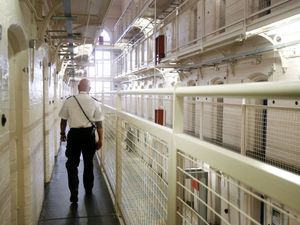Victims ‘in limbo’ as courts face delays amid bid to cut prison overcrowding
The Government rolled out emergency measures in England on Wednesday.

Court cases in England are facing delays after the Government launched an emergency plan to tackle the overcrowding “crisis” in jails.
Bail hearings and a suspect’s first appearance before magistrates after they have been charged with a crime by police are most likely to be affected under the Ministry of Justice’s (MoJ) so-called Operation Early Dawn.
But it could have a knock-on effect on other cases and types of hearings.

The long-standing contingency measure allows defendants to be held in police cells until prison beds become available but could mean their court dates are delayed or adjourned at short notice.
Justice officials are yet to confirm how many cases will be affected but stressed the measures, while rolled out across England, do not mean there will be delays in every region and insisted the plan was put in place to limit disruption.
Labour accused the Government of “stalling justice and leaving victims in limbo” in the wake of the news while legal bodies raised concerns about the “real-life consequences” of the delays.
Courts were told late on Tuesday that Operation Early Dawn would be put into action on Wednesday and is expected to last a week. The PA news agency understands the measure was last used for a week in March.
The move has raised questions as to whether defendants who would normally be held in custody on remand while their case moves through the courts may have to be initially released on bail. Although the Government said courts and police are not being instructed to do so.
It comes as Sir Keir Starmer urged Rishi Sunak to stop trying to issue “get out of jail free cards” to criminals, as he compared the Prime Minister to a “jumped-up milk monitor”.
The Labour leader used Prime Minister’s Questions in the Commons to press Mr Sunak for assurances that serious offenders would not be freed from jail early as part of a Government bid to cut overcrowding as he called on him to focus on the “chaos” facing prisons instead of “colourful lanyards” – a nod to suggestions ministers want to ban civil servants from wearing rainbow lanyards.
The Government sought to blame problems with jails reaching capacity on backlogs exacerbated by the coronavirus pandemic and the 2022 barrister’s strike. But prisons watchdog Charlie Taylor has branded the situation “entirely predictable”.
David McNeill, public affairs director at the Law Society of England and Wales which represents solicitors, described the situation as “administrative carnage”, telling BBC’s World At One programme of “disturbing accounts” of hearings being cancelled or postponed at the last minute.
Tom Franklin, the chief executive of the Magistrates’ Association, said: “We are very concerned about these further delays being imposed on cases reaching magistrates’ courts.
“Every case that is delayed has real-life consequences for victims, witnesses and defendants – and leads to magistrates and court staff sitting around waiting, rather than administering justice. That is a waste of resources, at a time when there are already large backlogs.
“It demonstrates the parlous state of the criminal justice system and the need for an injection of more resources at every stage of the justice process.”
It was “alarming” that information on the measure had been “scant”, with magistrates not informed, he said, adding that the association was “urgently” seeking answers from the MoJ.

Although justice officials highlighted the measure is not a new concept.
Chairman of the Bar Council Sam Townend KC decried the situation, saying: “We cannot continue like this.”
He said it was “wrong” for the Government to blame the barrister’s strike as a contributing factor on prisons and courts being in crisis and described Operation Early Dawn as “just one symptom of the chronic lack of investment in the criminal justice system”.
“Real and sustained investment in prisons, courts, judges, solicitors and barristers is needed and now, otherwise these emergency measures will just precipitate more,” he added.
Labour’s shadow justice secretary Shabana Mahmood said: “The Tories continue to make major and unprecedented changes to the justice system without so much as a word to the public.
“It’s completely unacceptable and the public will be alarmed at this latest panic measures.
“The Government is stalling justice and leaving victims in limbo because of the mess they have created.
“This is no way to run the justice system, and it is certainly no way to run the country.”
Pavan Dhaliwal, chief executive of criminal justice reform charity Revolving Doors, said the “stopgap measures” will not address the challenges facing the “overwhelmed justice system”, adding: “We call on the Government to instead provide a long-term plan to tackle the overcrowding crisis which includes the presumption against short sentences.”
A MoJ spokesman said: “This Government is categorical that the most dangerous offenders should stay behind bars for longer, which is why new laws will keep rapists locked up for every day of their prison sentence and ensure life means life for the most horrific murderers.
“We continue to see pressure on our prisons following the impact of the pandemic and barristers’ strike which is why we have initiated a previously used measure to securely transfer prisoners between courts and custody and ensure there is always a custody cell available should they be remanded.”





